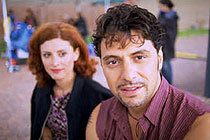|
|
|
|
Walking
on Water
|
 |
|
Many Australian films suffer from a lack of thematic focus, preferring to touch upon a predictable range of huge topics – life, death, suffering, family, remembrance – in a vague and token manner. Walking on Water sometimes begins to disperse in this way, but director Tony Ayres mostly manages to hang on to his central thread: comparing different types of grief or different reactions to death. But is this really a deeply worked out theme? Or is it more like a convenient topic on which to hang a number of characters and situations? Roger Monk's script describes, at times with great perceptiveness, the ways in which Charlie (Vince Colosimo) and Anna (Maria Theodorakis) cope with the death of their close friend, Gavin (David Bonney). Charlie takes refuge in drugs and decadence. Anna desperately affirms the possibility of human connection via an illicit fling. Knotty ethical issues engulf both characters, freezing them in a suspended state between existential authenticity and escapist denial. But to place Walking on Water beside Maurice Pialat's devastating The Mouth Agape (1974), a similar story of the ways in which members of a family react to the swift physical decline and death of a mother, is to see the extent to which Ayres and Monk pull their punches. Where Pialat followed the bleak consequences of his slice-of-life to their bitter conclusion, and in the process questioned the very nature of familial bonding, Walking on Water heads too quickly for a safe, therapeutic, Lantana-like exit-hatch. Admirably, the film makes no big deal of the fact that some of its characters are gay or that Gavin's death is presumably AIDS-related. However, like much contemporary art, its sympathies are clearly on the side of Gavin's chosen family, and those within it who pursue alternative lifestyles, over the more conventional members of his blood family. Gavin's brother, Simon (Nathaniel Dean), never comes alive as a character, and the truncated mourning of his mother, Margaret (Judi Farr), is rendered with little dignity or feeling. On the dramatic plane, the film delivers more than many local productions. The actors are uniformly good, forming a tight ensemble. Specific moments of emotional withdrawal or release are skilfully and truthfully handled. There are winning touches of understatement, especially in the final scene. The most frustrating aspect of Walking on Water, however, is its lack of a coherent, consistent style. Ayres adopts a manner that is all too prevalent in Australian cinema. Dialogue-laden scenes are presented in a bland, television-derived way, while the fleeting transitions between them are souped-up with slow motion, colour filters, moody music cues and symbolic affectations. This is a tiresome, short-circuiting alternation of the too-plain and the hyper-jazzy. And it is another sure sign of a filmmaker losing grasp of the core of a story. © Adrian Martin September 2002 |
![]()